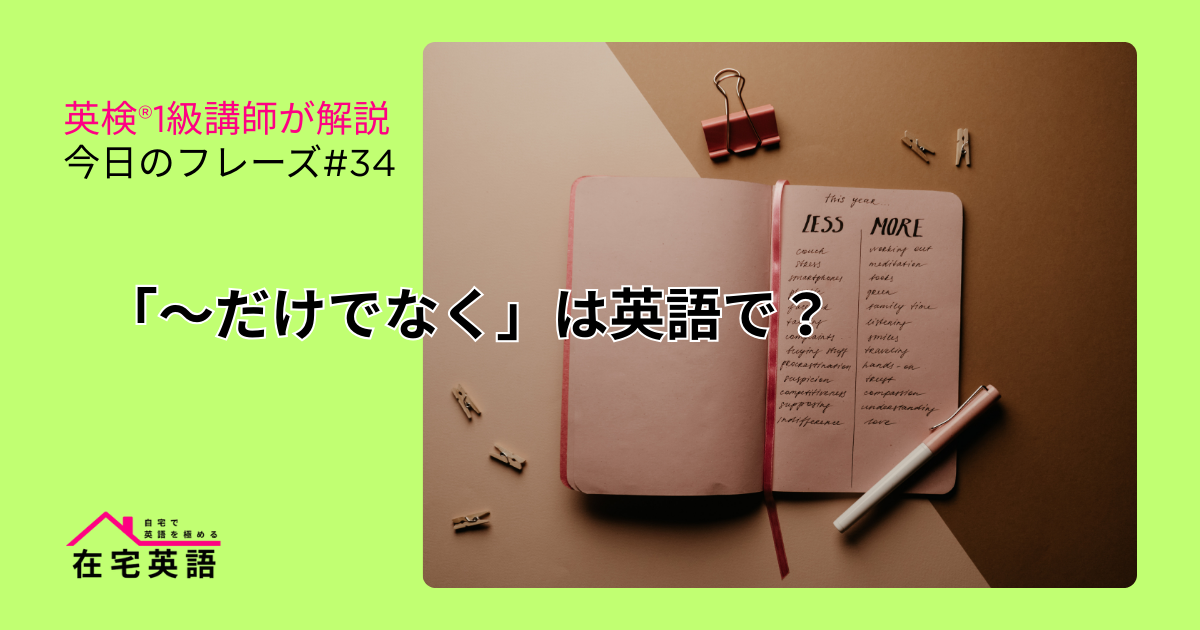【中学英語】重要熟語一覧150選(例文付き)高校入試対策で役立つ覚え方も解説

中学校で習う英語の基本は、文法だけではありません。文章をスムーズに読んだり、自分の考えを伝えたりするためには、単語と単語が組み合わさってできる「熟語」を覚えることがとても大切です。
この記事では、中学校1年生~3年生の英語で習う特に重要な熟語を厳選してご紹介します。学校のテストや、日々の英会話、そして高校入試に役立つものばかりです。意味と例文を一緒に覚えることで、実際に使える英語力を身につけましょう。

■この記事を書いた人
純ジャパながら独学で英検®1級、TOEIC®925を取得。年間300人以上に指導している現役英会話講師です。字幕・吹替・広告翻訳家としての顔も持ち、現在は1児の母として子育てと両立しながらフランス語も話すマルチリンガルに。メディア会社での役職経験を活かした分かりやすい解説で、英語学習に役立つコンテンツをお届けしています。
【中学1年】重要英熟語32選
まずは中学1年生で習う英語で重要になってくる熟語を覚えましょう。
動詞句21選
動詞句は、動詞と前置詞や副詞が組み合わさって、一つの意味を持つものです。この熟語を覚えることで、表現の幅がぐっと広がります。
熟語をタップすると意味と例文を確認できます。
be interested in
〜に興味がある
I am interested in learning about different cultures. (私は様々な文化について学ぶことに興味があります。)
be(get) excited
ワクワクする
I am excited about the school trip next week. (来週の修学旅行にワクワクしています。)
do one’s homework
宿題をする
I do my homework after school. (私は放課後に宿題をします。)
get up
起きる
I usually get up at 7 a.m. (私はたいてい朝7時に起きます。)
go to
〜へ行く
We go to school by bicycle. (私たちは自転車で学校に行きます。)
go back to
〜へ戻る
I went back to my house. (私は家に戻った。)
go straight
まっすぐ進む
Go straight for two blocks, and you’ll see the library. (2ブロックまっすぐ進むと図書館が見えます。)
help with
〜を手伝う
Can you help with my homework? (私の宿題を手伝ってくれますか?)
listen to
〜を聞く
I sometimes listen to music. (私はときどき音楽を聴きます。)
learn about
〜について学ぶ
We learn about the history of Japan in class. (授業で日本の歴史について学びます。)
look at
〜を見る
Please look at the picture on page 10. (10ページの写真を見てください。)
say again
もう一度言う
Could you say that again, please? (もう一度言っていただけますか?)
sit down
座る
Please sit down. (座ってください。)
stand up
立つ
Please stand up. (立ってください。)
stay up
(寝ないで)起きている
I stayed up last night. (私は昨夜は夜更かしをしました。)
take a rest
休憩する
I want to take a rest. (私は休憩したい。)
take out
〜を持ち帰る、テイクアウトする
We took out some pizza for dinner. (私たちは夕食にピザをいくつか持ち帰った。)
wait for
〜を待つ
I waited for the bus for an hour. (私は1時間バスを待ちました。)
walk to
〜まで歩く
We walk to the station every morning. (私たちは毎朝駅まで歩きます。)
worry about
〜について心配する
Don’t worry about the test. (テストのことは心配しないで。)
write down
〜を書き留める
Please write down the new words in your notebook. (新しい単語をノートに書き留めてください。)
副詞句11選
副詞句は、時間や場所、方法などを表す熟語です。文章をより具体的に説明するのに役立ちます。
熟語をタップすると意味と例文を確認できます。
a lot of
たくさんの
I have a lot of friends. (私にはたくさんの友達がいます。)
at noon
正午に
Let’s meet at noon for lunch. (正午に会ってランチにしましょう。)
between A and B
AとBの間に
The post office is between the bank and the supermarket. (郵便局は銀行とスーパーマーケットの間にあります。)
by bus
バスで
I go to the library by bus. (私はバスで図書館に行きます。)
for here
店内で、こちらで
Can I have this coffee for here? (このコーヒーを店内で飲めますか?)
to go
(持ち帰りで)持ち帰り
Can I have this coffee to go? (このコーヒーをテイクアウトで飲めますか?)
How about~?
〜はどうですか?
How about going to the park? (公園に行くのはどうですか?)
on the way
途中で
I saw a friend on the way to school. (学校に行く途中で友達に会いました。)
on weekends
週末に
I usually watch movies on weekends. (私はたいてい週末に映画を見ます。)
on your left(right)
あなたの左(右)に
The door is on your left. (ドアはあなたの左にあります。)
with a smile
笑顔で
She always talks with a smile. (彼女はいつも笑顔で話します。)
【中学2年】重要英熟語43選
中学2年生になると、英語の表現がもっと複雑になりますね。ここでは、学校の教科書や日常会話でよく使われる、覚えておくと便利な熟語をまとめました。
動詞句29選
動詞句は、動詞と前置詞や副詞が組み合わさって、一つの意味を持つものです。この熟語を覚えることで、表現の幅がぐっと広がります。
熟語をタップすると意味と例文を確認できます。
arrive at
〜に到着する
We arrived at the station. (私たちは駅に到着しました。)
ask 人 about
(人)に〜について尋ねる
I asked him about his favorite food. (私は彼に好きな食べ物について尋ねました。)
ask 人 for
(人)に〜を求める
She asked me for help with her project. (彼女は私にプロジェクトの手伝いを求めました。)
be born
生まれる
My brother was born in 2008. (私の兄は2008年に生まれました。)
be famous for
〜で有名である
This town is famous for its beautiful festival. (この町は美しい祭りで有名です。)
be kind to
〜に親切である
She is kind to all her friends. (彼女はすべての友達に親切です。)
be scared of
〜を怖がる
My sister is scared of dogs. (私の姉妹は犬を怖がります。)
call back
(後で)電話をかけ直す
I’ll call you back later. (後で電話をかけ直します。)
decide to
〜することに決める
We decided to go to the beach this weekend. (私たちは今週末、ビーチに行くことに決めました。)
get along with
〜と仲良くやる
I can get along with everyone in my class. (私はクラスのみんなと仲良くできます。)
get tired
疲れる
I get tired after playing soccer for two hours. (2時間サッカーをすると疲れます。)
go abroad
外国に行く
He wants to go abroad in the future. (彼は将来、外国に行きたいと思っています。)
live abroad
外国に住む
My cousin lives abroad. (私のいとこは海外に住んでいます。)
keep in touch
連絡を取り続ける
Let’s keep in touch in summer vacation. (夏休みも連絡を取り続けよう。)
leave for
〜へ向けて出発する
My dad left for Tokyo this morning. (私の父は今朝、東京へ向けて出発しました。)
leave for
〜へ向けて出発する
My dad left for Tokyo this morning. (私の父は今朝、東京へ向けて出発しました。)
look after
〜の世話をする
My sister looks after our dog every day. (私の姉は毎日、私たちの犬の世話をします。)
look for
〜を探す
I’m looking for my dog. (私は私の犬を探しています。)
make own bed
自分でベッドを整える
I make my own bed every morning. (私は毎朝自分でベッドを整えます。)
show 人 around
〜を探す
I will show you around my school tomorrow. (明日、私の学校をあなたに案内します。)
stand by
〜のそばに立つ、(人)を支える
I will always stand by you. (私はいつもあなたのそばにいます。)
take care of
〜の世話をする
Please take care of yourself. (ご自身を大切にしてくださいね。)
take ~ back
物を持って帰る、戻す
I’ll take the jacket back to the store.(このジャケットは店に返品します)
talk about
〜について話す
We talked about our summer vacation. (私たちは夏休みについて話しました。)
talk to 人
〜に話しかける
My friend talked to me after lunch. (私の友達は昼食の後私に話しかけた。)
think of
〜について考える、思う
What do you think of my new shoes? (私の新しい靴についてどう思いますか?)
try hard
一生懸命に努力する
I will try hard to pass the test. (私はテストに合格するために一生懸命に努力します。)
try on
〜を試着する
Can I try on this T-shirt? (このTシャツを試着してもいいですか?)
try to do
〜しようと試みる
I will try to run faster. (私はもっと速く走ろうとします。)
work for
〜で働く
My father works for a car company. (私の父は自動車会社で働いています。)
副詞句14選
副詞句は、時間や場所、方法などを表す熟語です。文章をより具体的に説明するのに役立ちます。
熟語をタップすると意味と例文を確認できます。
a few
いくつかの、2~3の
There are a few books on the table. (テーブルの上に何冊か本があります。)
a little
すこしの
I have a little time to read a book. (私は読書をする時間が少しあります。。)
and so on
〜など
We need pens, pencils, and so on. (私たちはペン、鉛筆などが必要です。)
every ~ minutes
~分おきに
The bus comes every 10 minutes.(バスは10分おきに来ます)
for example
たとえば
There are many animals in the zoo, for example, lions and elephants. (動物園にはたくさんの動物がいます。たとえば、ライオンやゾウです。)
from ~ to ~
〜から〜まで
The store is open from 9 a.m. to 5 p.m. (その店は午前9時から午後5時まで開いています。)
from now on
これからは
From now on, I will study English every day. (これからは毎日、英語を勉強します。)
from the experience
その経験から
From the experience, he learned to be more careful. (その経験から、彼はもっと注意深くなることを学びました。)
in the future
将来に
I want to be a doctor in the future. (私は将来、医者になりたいです。)
Let’s ~
〜しましょう
Let’s play soccer after school. (放課後、サッカーをしましょう。)
on the wall
壁に
There is a picture on the wall. (壁に絵が掛かっています。)
one day
ある日(過去)、いつか(未来)
One day, I want to travel around the world. (いつか、世界中を旅したいです。)
over there
あちらに
The bus stop is over there. (バス停はあちらにあります。)
too ~ for 人 to do
(人)にとって…するには〜すぎる
This box is too heavy for me to carry. (この箱は私には重すぎて運べません。)
【中学3年】重要英熟語75選
中学3年生の英語は、より複雑な表現や文法を学びます。熟語をマスターすることで、文章の読解力や表現力が格段に向上し、高校入試や英検3級の試験対策にも役立ちます。
動詞句42選
動詞句は、動詞と前置詞や副詞が組み合わさって、一つの意味を持つものです。この熟語を覚えることで、表現の幅がぐっと広がります。
熟語をタップすると意味と例文を確認できます。
be able to
〜することができる
She will be able to speak French soon. (彼女はすぐにフランス語を話せるようになるでしょう。)
be afraid of
〜を恐れる
Don’t be afraid of making mistakes. (間違いを恐れてはいけません。)
be covered with
~で覆われている
The mountain is covered with snow. (その山は雪で覆われています。)
be different from
〜と異なる
This book is different from the one I read last week. (この本は先週読んだものとは違います。)
be enough to
〜するのに十分である
The weather is warm enough to wear a T-shirt. (Tシャツを着るのに十分な暖かさです。)
be familiar with
〜に精通している
He is familiar with Japanese history. (彼は日本の歴史に精通しています。)
be famous for
〜で有名である
This city is famous for its delicious seafood. (この市はおいしい魚介類で有名です。)
be full of
〜でいっぱいである
The box is full of old toys. (その箱は古いおもちゃでいっぱいです。)
be good at
〜が得意である
She is good at playing the piano. (彼女はピアノを弾くのが得意です。)
be interested in
〜に興味がある
She is interested in animals. (彼女は動物に興味があります。)
be in trouble
困っている
He is in trouble because he lost his key. (彼は鍵をなくしたので困っています。)
be known as
〜として知られている
He is known as a good leader. (彼は良いリーダーとして知られています。)
be late for
〜に遅れる
I was late for school this morning. (今朝、学校に遅刻しました。)
be made from
〜(原料)でできている
Cheeze is made from milk. (チーズは牛乳からできています。)
be made of
〜(材料)でできている
This table is made of wood. (このテーブルは木でできています。)
be popular among
〜の間で人気がある
The math teacher is very popular among students. (その数学の先生は生徒たちの間でとても人気がある。)
be satisfied with
〜に満足している
I am satisfied with my new job. (私は新しい仕事に満足しています。)
be sick in bed
病気で寝ている
I’ve been sick in bed all day.(私は一日中病気で寝込んでいます。)
be surprised at
〜に驚く
We were surprised at the news. (私たちはそのニュースに驚きました。)
belong to
〜に所属する
I belong to the music club in school. (私は学校で音楽クラブに所属しています。)
come to
〜へ来る
My grandparents come to my house every winter. (祖父母は毎冬私の家に来る。)
do one’s best
〜の最善を尽くす
I’ll do my best to pass the exam. (その試験に合格するために最善を尽くします。)
get to
〜へ行く
Could you tell me how to get to the station? (駅への行き方を教えてくださいますか。)
give up
〜をあきらめる
Don’t give up. (あきらめないで。)
go on a picnic
ピクニックに行く
Let’s go on a picnic this weekend. (今週末ピクニックに行きましょう。)
go on a trip
旅行に行く
My family goes on a trip every summer. (私の家族は毎夏旅行に行く。)
go shopping
買い物に行く
My mother went shopping to buy some food. (私の母は食べ物を買いに買い物へ行った。)
go to bed
就寝する
It’s time to go to bed. (寝る時間です。)
get off
(乗り物から)降りる
Let’s get off at the next station. (次の駅で降りましょう。)
get on
(乗り物に)乗る
We got on the bus just in time. (私たちはぎりぎりでバスに乗りました。)
get out of
〜から出る
Please get out of my room. (私の部屋から出て行ってください。)
hear from
〜から便りがある
I haven’t heard from him for a long time. (彼から長い間便りがありません。)
make a speech
スピーチをする
I had to make a speech at the graduation ceremony. (卒業式でスピーチをしなければなりませんでした。)
say hello to 人
(人)によろしくと伝える
Please say hello to your mother for me. (あなたのお母さんによろしくお伝えください。)
sound good(great)
良さそうに聞こえる
Your idea sounds good. (あなたのアイデアは良さそうですね。)
speak to 人
〜に話しかける
I need to speak to my teacher. (先生に話しかける必要があります。)
take 人 to ~
(人)を〜へ連れていく
My father took me to the zoo. (私の父は私を動物園に連れて行ってくれました。)
take a trip
旅行する
We will take a trip to Okinawa next month. (私たちは来月、沖縄に旅行する予定です。)
take a walk
散歩する
Let’s take a walk in the park. (公園を散歩しましょう。)
take care of
〜の世話をする
I have to take care of my pet. (私はペットの世話をしなければならない。)
turn off
(電気などを)消す
Please turn off the light before you leave. (出る前に電気を消してください。)
turn on
(電気などを)つける
Please turn on the air conditioner. (エアコンをつけてください。)
write to
~に手紙を書く
I often wrtie to my friend in America. (私はアメリカにいる友達によく手紙を書く。)
副詞句33選
副詞句は、時間や場所、方法などを表す熟語です。文章をより具体的に説明するのに役立ちます。
熟語をタップすると意味と例文を確認できます。
a cup of
1杯の
Can I have a cup of coffee? (コーヒーを1杯いただけますか?)
a kind of
一種の
A tomato is a kind of vegetable. (トマトは野菜の一種です。)
all over the world
世界中で
People all over the world are watching the Olympic Games. (世界中の人々がオリンピックを見ています。)
at that time
その時
I was sleeping at that time. (その時、私は寝ていました。)
both of
両方とも
Both of them are my friends. (彼ら二人は両方とも私の友達です。)
by accident
偶然
We met by accident at a party. (私たちはパーティで偶然会った。)
by the way
ところで
By the way, what time is it now? (ところで、今何時ですか?)
each other
お互いに
We help each other. (私たちはお互いに助け合います。)
for a long time
長い間
I’ve been waiting for you for a long time. (長い間あなたを待っていました。)
for a while
しばらくの間
Please wait here for a while. (しばらくここで待っていてください。)
for oneself
自分のために
You have to think for yourself. (あなたは自分のために考えなければなりません。)
for the first time
初めて
I met him for the first time at the party. (私はパーティーで彼に初めて会いました。)
from A to B
AからBまで
The restaurant is open from 11 a.m. to 9 p.m. (レストランは午前11時から午後9時まで開店しています。)
in front of
〜の前に
I saw my teacher in front of the station. (駅前で先生に会いました。)
in my opinion
私の意見では
In my opinion, we should talk to the teacher. (私の意見では、私たちは先生に話した方がいい。)
just now
ついさっき
I finished my homework just now. (私はついさっき宿題を終えました。)
Me, too.
私も。
A: I like swimming. (私は水泳が好きです。)
B: Me, too. (私もです。)
not ~ at all
全く〜ない
I’m not tired at all. (私は全く疲れていません。)
of course
もちろん
Of course, you can come. (もちろん、来ていいですよ。)
one after another
次から次へと
The children came into the room one after another. (子供たちは次から次へと部屋に入ってきました。)
on foot
徒歩で
I go to school on foot. (私は徒歩で学校に行きます。)
on the internet
インターネットで
I looked for the information on the internet. (インターネットでその情報を探しました。)
out of
〜の外へ
He walked out of the room. (彼は部屋から出て行きました。)
right now
たった今
I’m busy right now. (私はたった今忙しいです。)
this time
今回は
We will win this time. (今回は私たちが勝ちます。)
such as
〜のような
I like fruits such as apples and oranges. (私はリンゴやオレンジのような果物が好きです。)
too much
あまりにも多くの
There is too much salt in this soup. (このスープには塩が多すぎます。)
too ~ to do
〜すぎて…できない
He is too young to understand the movie. (彼は幼すぎてその映画を理解できません。)
welcome to
〜へようこそ
Welcome to our school. (私たちの学校へようこそ。)
What time ~?
何時に〜?
What time does the movie start? (映画は何時に始まりますか?)
What’s up?
どうしたの?
What’s up? You look sad. (どうしたの?悲しそうだね。)
Why don’t you ~?
〜してはどうですか?
Why don’t you join us? (私たちに参加してはどうですか?)
Would you like ~?
〜はいかがですか?
Would you like some tea? (紅茶はいかがですか?)
高校入試で役立つ中学英語重要熟語の覚え方
ここからは、高校入試で役立つ中学英語の熟語の覚え方を見ていきましょう。
中学英語の熟語を覚えるコツ①文脈で覚える
単語や熟語は、単体で覚えるよりも、文章の中で使われている形で覚える方が記憶に残りやすいです。初見の熟語では、例文を読んで見るとより記憶に残りやすいでしょう。
インプットができたら、英作文やスピーキングでアウトプットすると良いでしょう。実際に自分で熟語を使うことで、より頭の中に定着します。
中学英語の熟語を覚えるコツ②グループ化して覚える
同じような意味を持つ熟語や、同じの動詞を使った熟語をまとめて覚えると効率的です。
▫️同じ意味でまとめる場合
- 世話をする
look after
take care of - 話しかける
speak to
talk to
▫️同じ動詞でまとめる場合
- try hard (一生懸命がんばる)
- try on (試着する)
- try to do (〜しようとする)
このようにリストアップすることで、頭の中が整理されて、熟語もより正確に覚えられると思います。
中学英語の熟語は基礎固めの第一歩
お疲れ様でした!本記事を通して、中学英語の熟語をどれくらい覚えているか確認できたのではないでしょうか。もし間違えてしまった問題があっても、心配いりません。復習のきっかけになったはずです。
中学英語の熟語は、高校英語はもちろん、その先の英会話や資格試験にもつながる重要な土台です。この記事をブックマークして、何度も繰り返し挑戦してみてくださいね。日々の積み重ねが、英語力を確実に伸ばします。
| 【関連記事】 📖【中学文法まとめ】単元一覧 |


